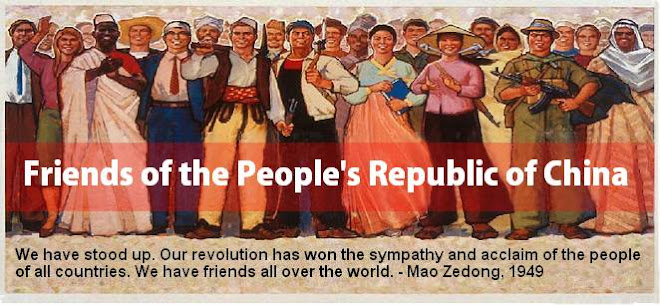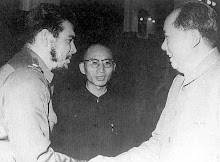Behind the reluctance of China and Africa to criticize Mugabe
By Howard W. French
Thursday, July 3, 2008
IHT
SHANGHAI: For a crisis involving African despotism, the
decibel readings in the West over Zimbabwe have reached
almost unprecedented levels.
Beyond the din of condemnations of Robert Mugabe, that
country's aging, power-obsessed tyrant, however, a great
many questions have gone unexamined.
Western governments led by London and Washington look at
Mugabe's rule and see such a clear-cut case of evil that
they are at a loss to understand why the rest of Africa -
or China, for that matter, a Security Council member with
fast-deepening ties with the continent - doesn't rush to
join in on their condemnation.
The Zimbabwe case should be more, though, than a tragedy
for its own people, for it presents an invaluable
opportunity to think about how differently the world can
look from different vantage points. And far from an idle
thought exercise, this might helpfully lead to a rethinking
of diplomatic strategy in Africa and in other parts of the
world.
As the second most important country in southern Africa,
Zimbabwe, like that region itself, has long functioned like
a kaleidoscope, serving up dramatically different
perspectives to different viewers.
I was reminded of this fact by the recent news that a South
African citizen of Chinese ancestry, Patrick Chong, had won
a lawsuit enabling him to be legally considered black. The
outcome was a triumph over a history of double
discrimination. Like other ethnic Chinese, the plaintiff,
who is chairman of the Chinese Association of South Africa,
was denied many basic rights during the apartheid era, and
he had also been denied the compensation won by the
country's black majority with the demise of a system of
legally enshrined racism.
As the perverse language of apartheid would have put it,
Chong has now become an "honorary black."
What does this all have to do with Zimbabwe? Before
Zimbabwe became a majority-ruled, independent country in
1980, and during the long years of apartheid in South
Africa, both of those countries were treated with similar
perversity as honorary members of the West.
While China was building the Tazara Railroad, to connect
Zambia's mines to Tanzania's ports in order to loosen
white-ruled South Africa's economic grip on the southern
half of the continent, the United States and Britain were
running diplomatic interference for apartheid rule in
Pretoria.
Washington often went further, backing South African
guerrilla proxies in places like Angola, prolonging
devastating wars there and elsewhere, and staving off
independence for South African-occupied Namibia in the name
of fighting communism.
Short memories abound, but in Africa this is not yet
ancient history. In 1987, while South Africa was actively
pursuing a policy of sabotage against its neighbors,
devastating vital infrastructure and supporting mass
killers like the Renamo rebels in Mozambique, Washington
reserved most of its indignation for "necklacing," a
small-bore terror tactic practiced by blacks in South
Africa. An amendment passed with overwhelming support in
the U.S. Senate requiring southern African countries to
condemn these lynchings or lose American aid.
Mugabe said it himself when he wrote in Foreign Affairs in
1987: "Political and material support of desperate bandit
groups, dissidents and self-seeking, discredited
individuals by a superpower like the United States is a
prescription for chaos and instability in the international
political system. Calling such a hodgepodge of individuals
'freedom fighters' does not make them any such thing."
Looking back, it isn't hard to conclude that China was in
many ways closer to being on the right side of history in
southern Africa than the United States, for all of
America's vaunted attachment to freedom, democracy and
human rights.
It is anything but clear that China has maintained that
position today, as it pursues neo-mercantilist policies and
abstains from pressuring Mugabe to end the campaign of
terror and economic devastation waged against his own
people.
Still, if one pauses to consider, it is relatively easy to
grasp why African leaders might question the good faith
behind the West's admirable sounding values and abstain
from the chorus of condemnations, or why the Chinese might
themselves be skeptical.
An African journalist wrote me this week, comparing the
vociferous Western response to Mugabe to the customary
silence that attends atrocities, political hijackings and
despotism on the continent, especially where critical
Western interests are in play. A former U.S. ambassador to
Zimbabwe had told her: "Everyone felt they had invested
something in the success of Zimbabwe, so when it all began
unraveling, everyone felt personally disappointed and let
down."
This looks too easy by half, and it is hard to avoid the
heretical question whether the vociferous response,
especially by Britain, isn't somehow related to race?
Unlike most of the continent, Rhodesia, like South Africa
and Kenya, were places where whites settled and became
attached.
Ivory Coast, another erstwhile showcase, was allowed to
cycle through stolen elections, coups, ethnic cleansing and
civil war, registering scarcely a ripple on the global
agenda.
But telling Africans they will be judged by how they line
up on Zimbabwe is counterproductive for other reasons, too.
The West's constant search for African leaders to anoint or
vilify is resented on the continent, and its track record,
moreover, is riddled with spots.
Paranoid African dictators look at the calls to denounce
Mugabe and worry they might be next. The more
democratically inclined know better. They see Washington's
embrace of dictators in places like Equatorial Guinea, or
even former enemies, like the robber baron former Marxists
who run Angola, and see a pattern of highly selective
outrage. Might the fact that these countries - to name but
two - are swimming in oil have something to do with
escaping the Mugabe treatment?
China looks at this inconsistency, too, and naturally
suspects it is being discriminated against. The only
African country that has drawn more Western critical fire
than Zimbabwe recently is Sudan, for its genocidal campaign
in Darfur. It's an emerging oil power, too, but unlike so
many African kleptocracies, its product flows east, not
west.
Subscribe to:
Post Comments (Atom)




No comments:
Post a Comment